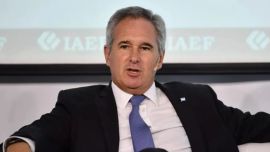With all the twists and tur ns of a campaign now at its halfway stage, between last month’s closure of nominations and next month’s PASO nationwide primary, it would be all too easy to lose sight of next Thursday’s 25th anniversary of the terrorist bombing of the AMIA Jewish community centre, which left 85 dead and over 300 injured. But this tragic milestone cannot be ignored amid continued impunity. Back then in 1994 the atrocity hit this city the day after the World Cup final, but such distractions were quickly forgotten by the bomb mayhem as public opinion responded in shock and horror to this terrorist crime – a reaction which the Argentine government then and others since have failed to reflect with any serious investigation. By the same token, however, no political fireworks should distract us now from this Thursday’s 25th anniversary.
The AMIA bombing was the bloodiest attack against the Jewish Diaspora anywhere in the world since the Shoah and also marks this city’s biggest loss of life in any disaster, apart from the Cromañon rock club blaze at the end of 2004, claiming 194 lives with over 1,400 people injured. But if the AMIA bloodbath failed to exceed the Cromañon toll, it was not for want of effort on the part of the terrorists – for sheer malign evil that car-bomb rammed into the heart of a building working for the good of a community cannot be matched.
Shamefully the impunity continues even if the year since the last anniversary has seen court verdicts reached for the initial cover-up almost a quarter-century later – last February ex-judge Juan José Galeano was sentenced to six years and former SIDE intelligence chief Hugo Anzorreguy to 54 months, among the seven convictions although former president Carlos Menem was acquitted. The fact that these sentences have been appealed by defendants and plaintiffs alike alone testifies to how disappointingly unsatisfactory this closure was. The investigation languished for a decade after the attack (when experts argue that the early days of a terror investigation are critical with the trail to the culprits drying up quickly) but the 2004 appointment of Alberto Nisman as special AMIA prosecutor by then-president Néstor Kirchner, followed by stern presidential condemnations of Iran at every annual United Nations General Assembly for several years, seemed to point to a new government commitment to justice.
But this was followed by a bewildering U-turn in 2012 when the Cristina Fernández de Kirchner administration announced a joint “truth commission” with Iran to find the culprits for the AMIA atrocity, an obscene absurdity premised on the Tehran government investigating itself. Nisman then turned his main energies to denouncing this pact and the plot only sickened with his mysterious death early in 2015. Instead of deploring this tragedy, Kirchnerite militants immediately started blackening his name in every way possible, some even asserting that the main victim was Fernández de Kirchner herself (very much alive today with good chances of returning to power in a few months’ time), rather than the dead man.
Since then President Mauricio Macri has not only consigned the obscene “truth commission” to oblivion but also pushed the full clarification of Nisman’s death as “murder” (even if both the homicide and suicide theories have various holes in them) while Pope Francis has always urged a serious investigation of the terrorist bombing. But the AMIA atrocity remains as far away from closure as ever and nobody should be forgetting this next Thursday when the siren sounds at 9.53am (the precise moment of the AMIA attack) if the dead are to be honoured.


















Comments